Solid Plastic-Free Shower Gel and Body Wash? What Do You Think?
Last month, I received an email from Carmen Drahl, senior correspondent for Chemical & Engineering News, wanting to know if I had heard about the new solid body wash products from Lush and Bomb Cosmetics, and if so, what I thought about them. To be honest, I thought she was just talking about bars of soap. What’s so new about that? But no. Actually, just as I learned that liquid soap and solid soap have different chemistries, so too do soap and shower gel. And as Carmen explained to me the difference between soap and shower gel, I started to get excited… Not for myself, but for my sister and others of her ilk.
A Plastic-Free Solution for the Soap Haters?
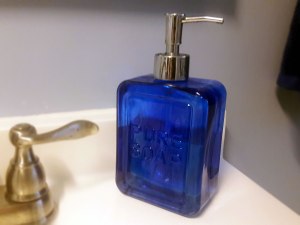
See, my sister hates solid bar soap with a passion. I’ve tried various all natural, handmade soaps on her, but she can detect a certain distasteful (to her) soapy smell in any and all bar soaps, no matter how natural they are. And she doesn’t like the squeaky clean way soap makes her skin feel, either. So I haven’t been able to convince her to give up liquid soap and shower gel or body wash in plastic bottles.  And apparently, she’s not alone. Back in 2010, I asked the question, “Why are body washes in plastic bottles more popular than bar soap?“  And while most respondents professed their love for solid soap bars (the readers of this blog are, after all, a very specific segment of the population), several gave reasons for preferring liquid soaps in bottles. I’ll get to those reasons further on in this post. The point is, could a solid, packaging-free version be the answer these die-hard shower gel fans have been looking for?
What’s the Difference Between Soap and Shower Gel?
In her article in Chemical & Engineering News, Drahl asks the question, “Solid body wash comes without packaging. But does that make it eco-friendly?” (May 9, 2018 online version, May 14, 2018 paper version)Â First a little chemistry:
Soaps, shower gels, and body washes contain surfactants, compounds that lower the surface tension between substances, helping to emulsify and wash away oily dirt. In soaps, the surfactants come from saponification, i.e. reacting some type of fat (e.g. olive oil, coconut oil, palm kernel oil, animal tallow) with lye (sodium hydroxide for solid soaps and potassium hydroxide for liquid soaps.) In shower gels and body washes, the surfactants come from synthetic detergents (e.g. sodium laureth sulfate), which can be derived from either petroleum or plant sources. Using these detergents gives the finished product a lower pH than soap, which can feel less drying (less “squeaky clean”) to the skin. Sodium stearate is added to create a solid version of shower gel.
Review of Lush Antiope solid shower gel
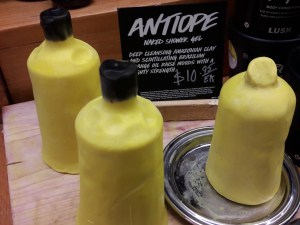 While I’m happy sticking with my natural solid soap from Aquarian Bath, I did purchase one of the new solid shower gels from Lush so I could review it for this blog. The only option in the store at the time was called Antiope, and while I wasn’t crazy about the smell or the bright yellow color, I coughed up the $10.95 + tax and purchased it anyway so I could share my findings with you. You’re welcome.
While I’m happy sticking with my natural solid soap from Aquarian Bath, I did purchase one of the new solid shower gels from Lush so I could review it for this blog. The only option in the store at the time was called Antiope, and while I wasn’t crazy about the smell or the bright yellow color, I coughed up the $10.95 + tax and purchased it anyway so I could share my findings with you. You’re welcome.
Ingredients in Lush solid shower gel
First, let’s look at the ingredients. Lush separates their ingredients into two categories: natural ingredients and “safe” synthetics. Usually, when we hear the word synthetic, we think of petroleum-derived chemicals. But synthetic chemicals can be derived from plant and animal sources, too. As far as I can tell after Googling madly this afternoon, “synthetic” simply refers to products created by humans via purposeful chemical reactions. Synthetic substances don’t exist in nature without human intervention, although they are sometimes created to mimic naturally occurring substances. By that definition, I guess soap could be considered synthetic because of the reaction of fats with lye. That’s not to say that all synthetic ingredients are safe but just that defining something as synthetic doesn’t automatically make it unsafe.
(And by the way, Bomb Cosmetics’s solid shower gels contains similar ingredients as Lush.)
Here are the “Natural Ingredients” in Lush Antiope solid shower gel:
- Suma Root Infusion (Pfaffia Paniculata)
- Pequi Oil (Caryocar Brasiliense)
- Guar Gum (Cyanopsis Tetragonoloba)
- Brazilian Orange Oil (Citrus Sinensis)
- Limonene
- Davana Oil (Artemisia Pallens)
- Galbanum Oil (Ferula Galbaniflua)
- White Amazonian Clay (Kaolin)
- Titanium Dioxide
- Citral
Here are the ingredients Lush considers to be “Safe Synthetics”:
- Propylene Glycol (derived from coconut or rapeseed oils)
- Sodium Laureth Sulfate (derived from coconut or palm kernel oil)
- Sodium Cocoamphoacetate (derived from coconut oil)
- Sodium Stearate (Lush doesn’t specify, although they do make the claim that all of their products are vegetarian)
- Lauryl Betaine (derived from vegetables)
- Fragrance (Lush doesn’t disclose the ingredients in its fragrance.)
- Yellow 10 Lake (synthetic dye produced from petroleum or coal tar sources, according to EWG.)
The Internet is full of conflicting information about the safety of these ingredients, but the one that stands out to me as the most problematic is actually “Fragrance.” It’s a problem because Lush doesn’t disclose (and doesn’t have to disclose) what ingredients are in it, and yet there are nearly 4,000 different ingredients reportedly used in fragrances, according to the International Fragrance Association, and some of them are chemicals of concern. For example, phthalates — endocrine-disrupting chemicals used to soften plastics and to help scents last longer — are often used in fragrances without disclosure to consumers. So I don’t buy any products that simply list “fragrance” on the label without listing the ingredients in the fragrance. (Read WVW’s report Unpacking the Fragrance Industry for more information.)
Also, here is some information about why palm oil is a problem.
Ingredients in Dial liquid body wash
 To be fair, Lush’s solid shower gel ingredients are certainly preferable to those in conventional products. Check out the list of ingredients in Dial Spring Water Hydrating Body Wash:
To be fair, Lush’s solid shower gel ingredients are certainly preferable to those in conventional products. Check out the list of ingredients in Dial Spring Water Hydrating Body Wash:
Water, Sodium Laureth Sulfate, Cocamidopropyl Betaine, PEG-8, Glycerin, Fragrance, Polyquaternium-10, Cocamidopropyl PG-Dimonium Chloride, Isostearamidopropyl Morpholine Lactate, DMDM Hydantoin, Citric Acid, Tetrasodium EDTA, Sodium Chloride, Blue 1, Red 33.
Whew. Nothing natural about that, is there?
Ingredients in Aquarian Bath soap
While the ingredients in Lush shower gel might be safer than those of conventional shower gel brands, let’s compare them to the ingredients in my favorite brand of solid soap, which doesn’t contain detergents or other synthetic chemicals.
 Aquarian Bath’s Lavender Oatmeal Soap contains: lavender essential oil, benzoin resin, saponified castor oil, saponified olive oil pomace, saponified raw unrefined shea butter, saponified Organic extra virgin olive oil, saponified Organic coconut oil, Organic ground oatmeal.
Aquarian Bath’s Lavender Oatmeal Soap contains: lavender essential oil, benzoin resin, saponified castor oil, saponified olive oil pomace, saponified raw unrefined shea butter, saponified Organic extra virgin olive oil, saponified Organic coconut oil, Organic ground oatmeal.
Please note that “saponified” means that sodium hydroxide (lye) has been used to turn the oils into soap. Sodium hydroxide would be the only synthetic ingredient, as Aquarian Bath does not use any synthetic detergents, fragrances, or dyes. This soap is also vegan, nongmo, palm oil-free, and it ships without plastic packaging.
But back to the Lush shower gel bar…
Getting Past the Smell
 Okay, this is not really a critique of solid shower gel in general but a comment on Lush’s Antiope fragrance. I brought the bar home and set it next to my computer. For several days, this weird scent would waft past my nostrils. There was something familiar about it that I couldn’t place until finally, it dawned on me. It smells like a freaking ashtray! Like an ashtray the night after a big party.  But scented. Botanical Essence of Ashtray, perhaps. So I laughed reading the reviews on Lush’s website and found that several other people had noticed the cigarette butt smell as well. The funniest comment is:
Okay, this is not really a critique of solid shower gel in general but a comment on Lush’s Antiope fragrance. I brought the bar home and set it next to my computer. For several days, this weird scent would waft past my nostrils. There was something familiar about it that I couldn’t place until finally, it dawned on me. It smells like a freaking ashtray! Like an ashtray the night after a big party.  But scented. Botanical Essence of Ashtray, perhaps. So I laughed reading the reviews on Lush’s website and found that several other people had noticed the cigarette butt smell as well. The funniest comment is:
This is the first scent from Lush that I have been disappointed in. The soap smells almost like it is made of ground up cigarettes. Even my partner who is a smoker thought someone had been smoking in the bathroom after I used it.
Now, keep in my mind that I have a very sensitive nose. And if you read the other comments on the site, you will see that not everyone hates the smell. Some people acknowledge the initial cigarette smell but note that it doesn’t smell that way when you actually use it. Which is true. (One woman said it made her feel like a warrior goddess.)
So, let me tell you what it was like to use it.
Using Solid Shower Gel
 Yep, I took a picture of myself in the shower. I’m not sure whether to say, “I’m sorry” or “You’re welcome.” But I wanted to see what it was like to use this stuff.
Yep, I took a picture of myself in the shower. I’m not sure whether to say, “I’m sorry” or “You’re welcome.” But I wanted to see what it was like to use this stuff.
The bottle shape, while clever, makes it a little more difficult to hold onto than a regular soap bar. But unlike body wash in a bottle, which for me, tends to get wasted as I pour it into my hand and then try to slather it on my body, all of the solid shower gel that comes off the bar actually makes it onto your skin.
The consistency of the “gel” is actually not so gel-like. It does feel somewhat different from soap. Perhaps creamier and less… um… soapy? That’s just bad writing, but I’m not sure how else to describe it. The fluorescent color on my skin was a bit shocking. (It’s actually brighter than I could capture in this photo.)

Supposedly, the pH of shower gel is lower and therefore less drying than soap. But the rich, handmade soaps I use have never left my skin feeling dry. And honestly, I think the temperature and frequency of showers is a more important factor than what type of cleanser I use on my skin. Frequent long, hot showers dry out the skin. My solution for dry skin? Turn down the heat and shower less frequently.
So, what did other family members think of the shower gel? My niece tried it and said it definitely feels different from soap. She liked it and said she would use it, so I gave it to her. My sister, on the other hand, had the same problem as I did with the smell. Oh well.
Are Solid Soaps and Body Washes Inherently Icky?
Everything else being equal, solid shower gel is certainly better for the environment than shower gel packaged in plastic (not to mention it’s more energy efficient to ship solid, concentrated products than those that contain water). Still, there are other reasons people cite for choosing bottled soap products over solid. And the makers of Old Spice body wash capitalize on those fears (or create them?) in this 2007 commercial that is both funny-cuz-it’s-true and also frustrating for those of us trying to make better environmental decisions.
Germs
For years, I’ve argued with people who feel that sharing a bar of soap is less hygienic than sharing a plastic bottle. My point is that the bar gets rinsed off every time. The bottle does not. But the truth is that germs do accumulate on bar soap (and presumably solid shower gel and body wash.) Even so, the most cited study of the subject demonstrated that even when bar soaps were inoculated with bacteria (E. coli and Pseudomonas aeruginosa), those germs did not transfer to the hands of the participants after washing the way they normally would. And a subsequent study found that the bar soaps that tend to harbor the most bacteria are those that are kept wet and not allowed to dry out between uses.
 The best way to reduce your exposure to germs on bar soap is to make sure you rinse it off before use and store it in the type of soap dish that will allow it to drain instead of dissolving into gooey slime. When I noticed that my handsoaps were turning to puddles in my soap dish, I got a stainless steel soap saver insert that fits right inside it. I’m pretty sure it saved my marriage.
The best way to reduce your exposure to germs on bar soap is to make sure you rinse it off before use and store it in the type of soap dish that will allow it to drain instead of dissolving into gooey slime. When I noticed that my handsoaps were turning to puddles in my soap dish, I got a stainless steel soap saver insert that fits right inside it. I’m pretty sure it saved my marriage.
Similarly, allowing your solid shower gel to drain and dry out between uses will make it last longer and be less likely to harbor bacteria.

But possibly the thing that grosses people out the most is not the idea of bacteria but that stray hair staring you in the face that your kid or roommate or significant other left on the soap for you. All I have to say to that is, People, have some consideration and stop being pigs. Rinse off the soap bar before you get out of the shower. Also, wring out your washcloth, replace the toilet paper roll, and don’t leave your clothes in the middle of the floor for someone to trip over. I’m not your mother!
(Deep cleansing breath.)
So, what do you think? Are you a shower gel person or a soap person? And do you think the new solid shower gels are a good idea despite their synthetic ingredients?









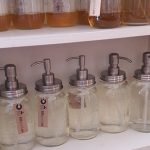
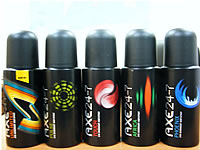
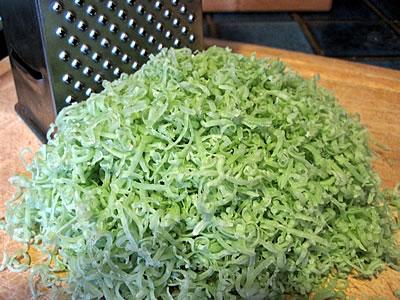

Thanks for the great piece. Even something as simple as shower gel demands careful thinking. And, if we want a change in behavior, probably a re-engineering from the product up. Most people will not make a compromise on function, convenience, ingredient integrity or price, even if it’s to save the environment. It’s true that younger generations like gel more than solid soaps, which of course means more plastic packaging… UGH. My company HiBAR https://www.hellohibar.com has worked through the complexities of shampoo and conditioner. Table stakes are: no plastic, convenient, inexpensive, effective, beautiful, and in a brand that elevates the experience from one of conscientiousness to include, also, indulgence, beauty, optimism. It’s a tall order. And that’s just shampoo.
Good post, These are no longer available in Lush, unsure if they are redeveloping them or discontinued. My question is, where did your sister get the blue glass soap bottle as I want one!
I’ll ask her and let you know! :-)
Im new in the blogging world and also in the plastic-free world – I really enjoyed reading about LUSH
I hope you didn’t conclude that you want to buy anything made by this company, Lush. It’s selling extremely toxic chemical products embedded with ocean-destroying glitter and plastic objects which hopefully will be banned. As one example only of the toxic ingredients in their bath “bombsâ€, fluorphlogopite is a fluorine chemical developed in the 1960s as a type of synthetic asbestos. Fluorine chemicals include so-called “flame retardantsâ€, among the most toxic chemicals known to man. Fluorine is the halogen in Teflon. DuPont was fined the largest fine in history for not telling the government about the dangers of Teflon. So-called “fragrance†are toxic synthetic musk products that are known endocrine disruptors. Titanium dioxide, Yellow Lake–the list of toxic ingredients in these products is endless.
It makes zero sense to avoid plastic and embrace toxic chemicals. Plastic is only one of millions of toxic chemicals manufactured by the chemical industry. I think when you saw “Chemical Engineering”, it should have tipped you off that this person is trolling for “natural†sites that can help her spread pro-chemical propaganda.
Check out Cal-Ben products. They’re truly natural. Yes, the liquid soap is packaged in plastic. So I buy their almond bar soap. The issue with plastic is that nontoxic alternatives have been available for decades, but the chlorine and petroleum industries have kept them off the market just like they kept solar off the market for generations.
I think the marketing execs from the world of bottled water moved to Lush. At some point the scales will tip and the majority of people will see past the greenwash. However, in the meantime, the greenwash, marketing spin, misinformation, incomplete or dodgy “studies” will make them a lot of cash.
Thank You so much for this blog as a whole Beth! My family and I are slowly transitioning into a greener lifestyle and are going to continue to work on the green life even when we start our journey onto the road full-time! I love your blog and the information you have here so much! I recently started my own blog thatonecrazylady.com and will also be posting about our journey onto the road and into the more environmental friendly way of living!
For people who don’t like the “soapy” smell, I think it’s the “aldehyde” that they are smelling. Some people feel that it “stings” their nose.
http://www.basenotes.net/threads/429956-What-do-aldehydes-smell-like
https://enviroklenz.com/how-to-cope-with-fragrance-allergies/
Beth, may I suggest you do some research on olive pomace oil? People use it in soap/etc for the sole reason of saving a few bucks but it is the most wretched stuff. Nasty synthetic toxic solvents used to extract it (the manufacturers will say “but the solvent all evaporates”; One, I don’t believe that and two, where exactly does it go?). It is insanity to mix pomace with organic ingredients. How much are they really saving?
Pomace Olive oil is food grade and prepared the same way other generic vegetable oils like peanut, soy, canola, and also soy proteins. The solvent is used to get the last bit of oil from the Olives thereby preventing waste. Here is a quote from the Canadian Government on Hexane “On the basis of ecological hazard and reported releases of n-hexane, it is concluded that this substance is not entering the environment in a quantity or concentration or under conditions that have or may have an immediate or long-term harmful effect on the environment or its biological diversity, or that constitute or may constitute a danger to the environment on which life depends.” It does not persist in the environment, which means it degrades after evaporation. We keep using pomace at a rate of 5-15% because based on experience, I believe I need an oil in my formulas at this ratio that is a bit lighter than Organic Extra Virgin Olive oil. Pomace I can get for the same price as Organic Soy which is a light oil, but less stable. So there are more factors than price that are taken into consideration. I can get Pomace oil in metal cans rather than plastic about 95% of the time. That is a big positive, since we are trying to reduce plastic use. Pomace also is has a better shelf life at room temperature compared to Organic Soy oil and Organic Hemp oil. If I wanted a light oil in bulk like soy, I would need an additional fridge, and even then the long term shelf life of the products would decline and there would be much more loss and waste. We do use Organic Hemp oil as a light oil in a few of our shampoos and soaps, but it is not available bulk, and it is also not as stable compared to Pomace, so we limit the use to a few recipes and keep the oil in the freezer and not at room temperature.
Do you know of any other solid shower gel brands out there, other than the aforementioned Lush and Bomb ones?
Those are the only ones I know about. But that doesn’t mean there couldn’t be others. :-)
There is a New Zealand brand called Ethique, they make all solid soaps, body wash, deodorants, shampoos, conditioners and moisturisers and package them in compostable packaging only (i.e. no plastic!).
I’m glad I never switched to shower gel because now that I’m more conscious of plastics, it isn’t something that I have to worry about. My husband and I both use Greenstone bar soaps (my favorite is Almond and Honey, his is Calendula Flower and Tangerine). We first used them when we stayed at a bed and breakfast that had samples of their soaps. They are located in Sautee GA and the bars come wrapped in a paper strip with multiple bars wrapped in tissue paper. They use compostable packing pellets, too. My husband is very sensitive to strong scents —he can’t walk through the soap section of Whole Foods—But Greenstone soaps do not set off his allergies. They also have a bar soap for pets.
Thanks for the recommendation!!
This is one product I have an extremely difficult time moving away from…I too hate bar soap. It tends to leave a film in my tub (and on my skin) and I really hate scrubbing the tub. And I just like the lather better when used with my mesh scrubbie (yes, ugh, plastic, but it lasts me a long time and you don’t need to use a lot of gel with it to get lots of suds). Plaine Products (https://www.plaineproducts.com) offers a shower gel in their line of refillable bath products which I’m going to try. I already use their shampoo and lotion, both of which use ingredients they’re proud to disclose and seem more benign in the world of personal care products. They are a little pricey, but you get what you pay for and they do seem to last longer than the grocery store brands. They also smell incredible and “fragrance” is not on their ingredient list, just essential oils. Plaine Products uses plastic-free packaging (except for the pumps, which you keep and just move to the new aluminum bottle when you’re ready for a refill).
That product sounds really interesting! However, I will be curious to find out from you if it leaves soap scum or not. From the ingredients, it appears to be liquid soap rather than shower gel, as the primary surfactants are “saponified oils of coconut and safflower seed,” which means soap. But the blend of essential oils sounds amazing. Please let us know how you like it!
Thanks so much for including Aquarian Bath’s Lavender Oatmeal soap in your blog post. : )
Cory, your stuff is amazing.
Hi Beth! I’ve looked high and low for pump soap dispenser with no plastic parts. There are the “mostly stainless steel” pumps, but they all seem to have that plastic tube that extends to the bottom. As an alternative, I’ve been brining olive oil bottles (with a cork stopper and metal pour spout) to the health food store and refilling them with Dr. Bronner’s. It works well in the shower, but I’m worried for the day it slips out of my hand. Any suggestions?
Hi, John! I too am wary of glass in the shower. While I don’t use liquid soap, I do have a plastic squeeze bottle in the shower of my apple cider vinegar solution that I use on my hair. It’s an old bottle that I already had — I didn’t purchase it new. I feel fine about that because dropping glass in the shower would be very bad.
Have you tried sliding a silicone bottle sleeve onto it? I had one that came on a glass water bottle I had bought for a few dollars at Target. The bottle leaked so much it was useless, but I wrenched off the silicone protective grippy wrapper thingy and transferred it to the glass jar I keep in the bathroom with my homemade hair rinse.
Alternatively, you could wrap a bunch of rubber bands around the bottle for a better grip, though they won’t help if the bottle is dropped.
Thanks for the information. I agree; it was very well researched and thorough.
I am a shower gel person. Although it really pains me to put the empty plastic bottles in the recycling bin, I justify it by telling myself that the quality products I use (from The Body Shop) go a long way.
Oh, just wanted to add that this post is extremely informative (parts about formulas and plant-derived synthetics). Thank you for your meticulous research and generosity in sharing the knowledge!!
Beth, I laughed so much reading parts of this post; the cigarette smell part was the funniest bit! I’m a bar soap fan for life.
I, too, have a REALLY sensitive nose bar soaps don’t bother me. I’m with your sister though, SOME bar soaps totally give off a really distasteful scent that I pick up off other people in public. I feel so terrible when I get disgusted, although I know they’re totally clean. :-P
This being said, what I’ve recently given up is shampoo bar/solid shampoo. No formula I found was gentle enough for my scalp and hair, and I could not afford to buy more bars to try out. They’re all living second lives as handwash bars around my house now, but I’m totally buying shampoo in bottles and my hair/scalp is much happier for it.
Hope the East Coast is treatin’ you and the kitties well!
Hi, Jeannie! How are you? I miss the Bay Area, but I may be back for a visit at the end of this month. It’s getting very hot and humid here. :-)